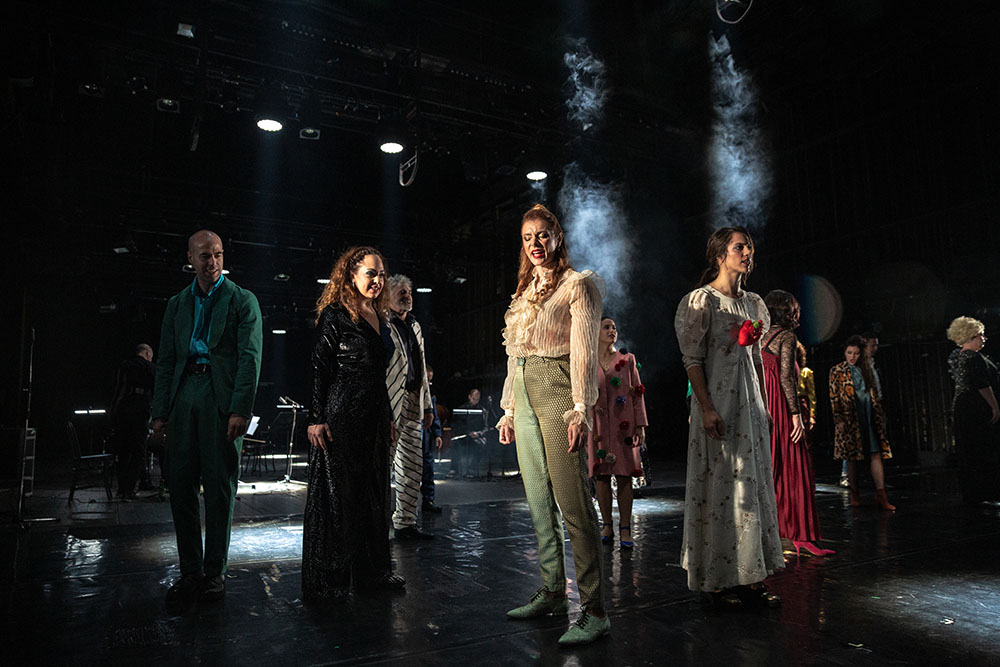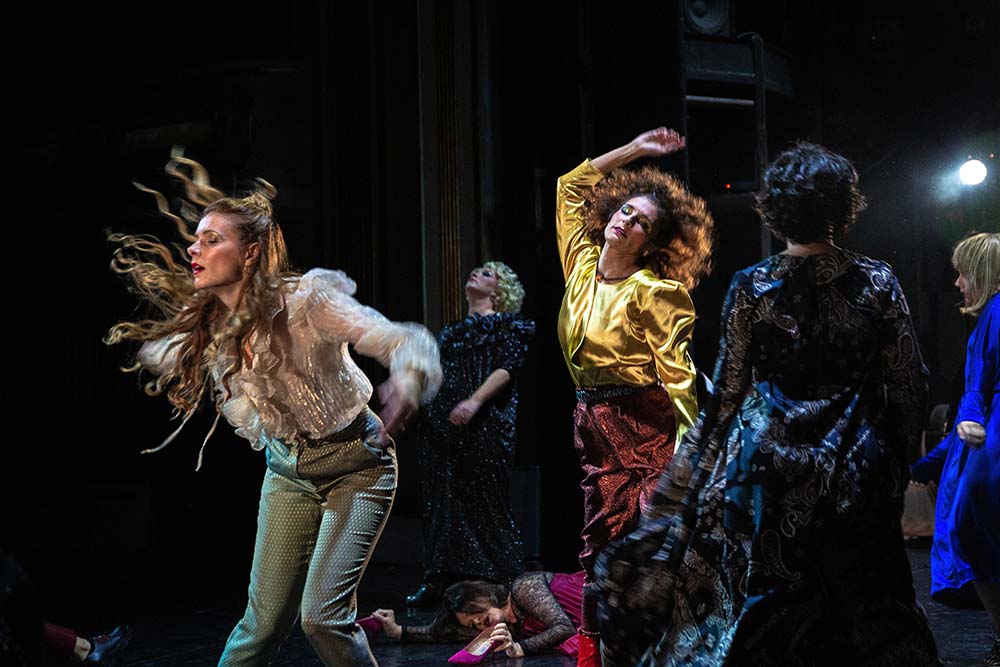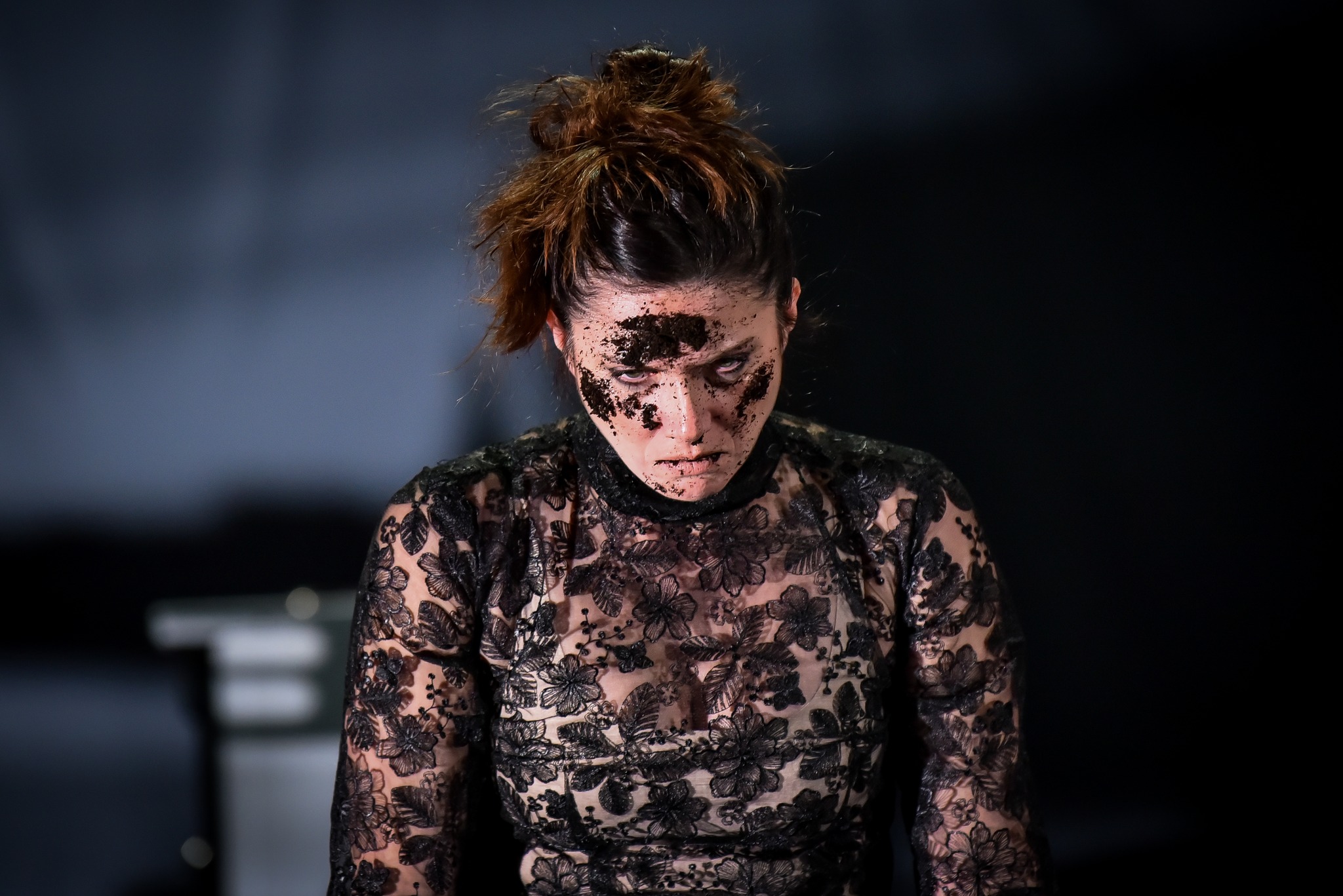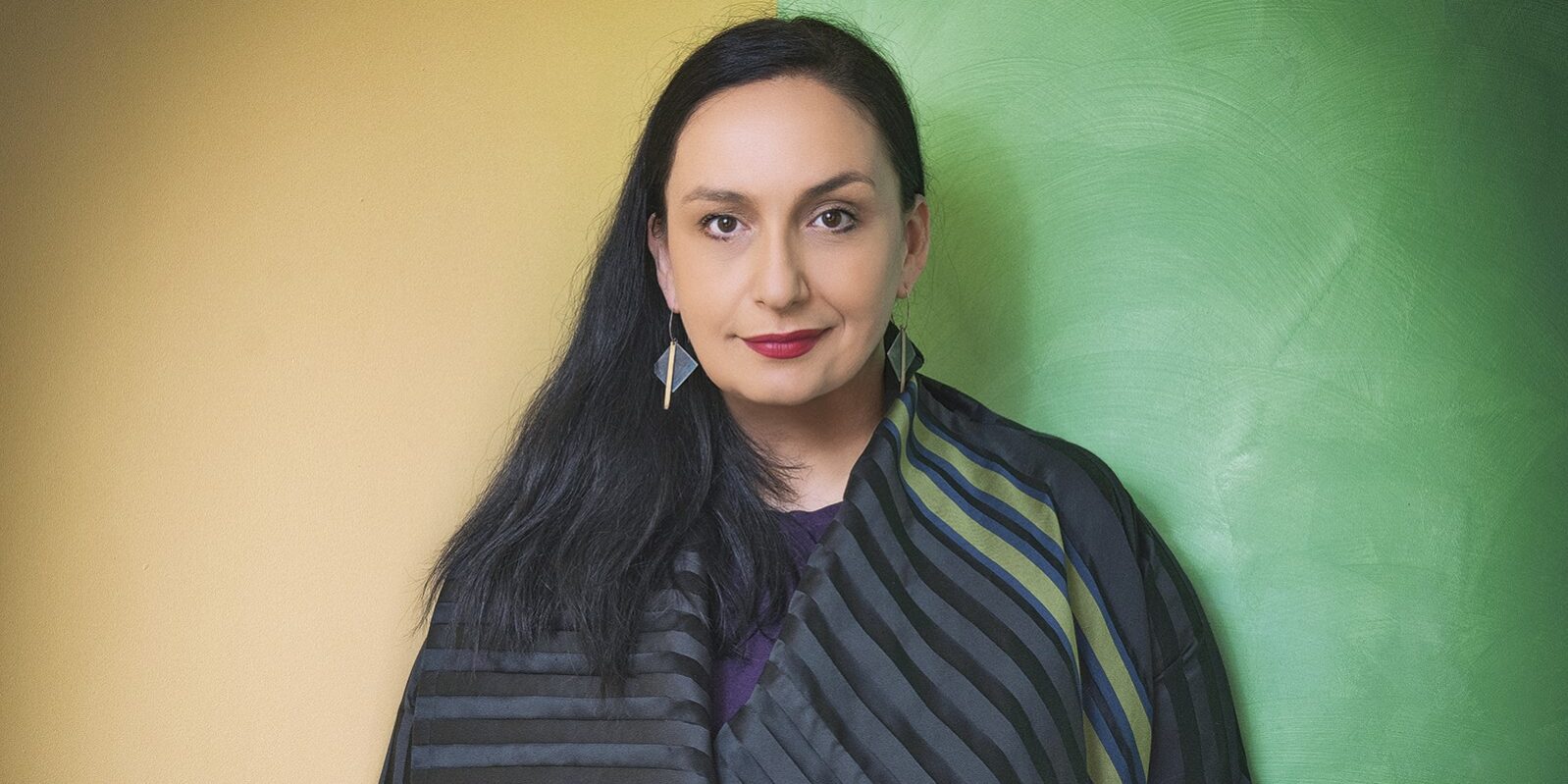Composer Irena Popović Dragović has worked with many notable directors including Oliver Frljić, Andraš Urban, and Kokan Mladenović. Recently she directed Children, based on the novel by Milena Marković for the National Theatre in Belgrade. She speaks to Igor Burić about taking on the role of director and the battles that still need to be fought as a female composer
Igor Burić: Children is the first work in which you are the complete author, the composer and director – is this something you’ve been preparing for your whole life?
Irena Popović Dragović: Sometimes you spend your entire life dreaming of what you would like to do. When I read Milena’s novel, I wished I had some form of encounter with this poetry through my music. I didn’t expect it to happen and that my wish would be achieved so spectacularly. I am infinitely grateful for that.
Igor Burić: How different was the process of working on this from your other projects? What is special about this show for you?
Irena Popović Dragović: Children is the fulfilment of my greatest desire, which was to do something of my own. For a long time I dreamed of how wonderful it would be to make a kind of musical poetic theatre in which we would combine different art forms and gather people who want to express their ideas in a new way.
Then I received a call from the management of the National Theatre in Belgrade with this unique offer to deliver Children. The days and nights that followed were a mix of beauty and nightmare. Up until then all my other projects had directors who were responsible for everything, and now it was happening to me – for the first time, this responsible person was me. This process has changed me on different levels. I feel with my whole being that we were giving birth to a special theatrical child.
Igor Burić: What inspiration did you draw from Milena Marković’s book and its exploration of childhood?
Irena Popović Dragović: Transforming this piece into an opera required a kind of ritual – the ritual of returning to oneself, to the inner child. As adults, we are locked up, we rarely allow ourselves to release that child. We live in a world of rules and codes. Children are the only creatures for whom there are no rules.
In the performance my actors have an almost unique and cathartic relationship, both to their inner child and to the audience. By releasing this energy, we go through a vortex of emotions that leads us into the past. It transports us back to a time of carelessness.
On stage there is a body composed of actors, singers and musicians in which the actors often move into the orchestra, and the musicians often enter the actors’ space. I’m grateful to all my actors for trusting me and leaving their comfort zone. We don’t have characters in this opera, as such. Together they make one voice, a complex, layered, emotional, gentle, and funny voice – Milena’s voice. There’s a choir, a children’s choir, watching us all the time and their angelic voices cause such an emotional charge that you have the impression that they are from another planet. They are there to remind us never to stop being children.

Children at National Theatre Belgrade
Igor Burić: As a participant in one of your workshops, I know that you cultivate an atmosphere of freedom and unrestrained creativity when it comes to creative endeavours. Was this also the case with Children, until you found the final form of the work?
Irena Popović Dragović: I embarked on the project not sure of how big and important it really was. For me, Milena’s novel was the essence of pure energy. During the process, I allowed myself at times not to know what I would do or where to go, but I always had music as a framework. I believed in the emotional strength of Milena’s words and my music.
My compass was a creative team of carefully selected artists who I knew would know how to cleverly become part of our common fabric. I am grateful to Selena Orb, costume designer, for her unreserved female support; Jelena Novak, another wonderful woman, my great friend, who shared her vast experience of knowledge of contemporary opera trends and helped us a lot in strengthening and inventing almost every element of the opera; Igor Koruga who created a specific world of movement that only he can design and often opened new paths for me when I did not know how to carry on. And to Dimitrije Kokanov, a connoisseur of Milena’s creativity, a very prolific writer and an excellent dramaturg. He managed to write a libretto for Children that was not based on dramatic conflict. His work was very layered and difficult. All my associates had complete freedom to find that child in themselves and to use this.

Deca, Narodno Pozoriste, Beograd
Igor Burić: Why did you decide to write for theatre and not to make some other kind of music?
Irena Popović Dragović: I’m more and more sure that the theatre has found me and kept me. I compose music for film, but much less. In Salzburg, I founded the group Music Material Processing Industry that brings together artists from different backgrounds. Oh, meine liebe Constanze is a subgroup of the Processing Industry and is made up of a Vocal Cultural Artistic Society of Expanding Women. It’s a band of women who sing about love. I’ve had several projects that I’ve done all over Europe and when I look back, they were my first staging.
Igor Burić: How important is the struggle for women’s rights, when it comes to composers and contemporary music, not to mention literature, film and theatre?
Irena Popović Dragović: My struggle is daily. I struggle first as a woman, and then as a mother, and all this unites in me as an artistic being who still has that crucial need to create although often the obligations of so-called real life do not allow it. I struggle to instil in my children a value system based primarily on kindness and love, I try to enlighten the environment in which they live so they learn that there are weak and fragile people, that there are animals and plants that are the inexhaustible source of that primordial, unconditional love. My days feel too short, too full of obligations and duties.
From this brief confession of a woman, who is also a mother and, according to some criteria, a very successful artist, too, you can conclude without thinking about it too much that the society in which we live cherishes above all the cult of patriarchy and that regardless of the aspiration for equality of the sexes, we still cannot say that we are a society in which women are equally valued as men. What’s even more shocking is that women aren’t protected.
I want to decide what I can’t do; I don’t have to and I don’t want to. I haven’t achieved that yet, so I often find myself ground down by my own schedule. I fantasize about mornings without a schedule.
I would like to briefly mention the woman who paved the way for all of us, who through her life and work, her principles and attitudes, both human and professional. Ljubica Marić was the first person in Serbia with a degree in composition, one of the first conductors in Europe and the first conductor of the Czech Radio Symphony Orchestra. Ljubica signed Vojislav Vuckovic‘s Strasbourg Manifesto, which condemns art for the sake of art, fights art that isn’t in touch with reality, and fights for engaged art. She was arrested. All this jeopardized her career, but did not make her betray herself and her principles. But she failed to make a mark as a great conductor because patriarchal codes prevented a woman from leading an organisation such as a symphony orchestra. The woman left behind an indelible mark in contemporary composition, and actively fought against the nationalist regime in Serbia.
Today we are all fighting battles: to be adequately paid. to have the right to sick leave, to have the right to lead large orchestras and to have a nice rest afterwards.
Igor Burić: What would be necessary, politically or otherwise, for that to happen?
Irena Popović Dragović: The best, the most successful, and the strongest must provide an example of how to build one’s own identity and authority. My path in life was not arranged for me by my dad, brother or godfather. I worked a lot on myself, invested in education, and went abroad. I cleaned hotels, gave private lessons and at the same time finished the Mozarteum in Salzburg. We live in a land of fake diplomas and stolen ideas. We are led by people who are not concerned with higher goals and perspectives. The system does not encourage any form of betterment. It is easy to rule a frightened people, it is easy to deceive them and lead them to the precipice.
Igor Burić: What do you strive for, what fulfils you the most?
Irena Popović Dragović: Freedom: to be able to write everything I hear and put it in the air with ease, free of any emotion or worry about whether someone will like it or not. I have a great responsibility as a human and an artist and that’s why I am often my own greatest critic and worst judge.
I don’t separate art from life. I believe that striving for excellence in art is as important as striving to be exceptional as a human. Qualities such as empathy, gentleness, kindness, become devalued in a world where the acquisition of goods is what people aspire to most. I’m not up to date with the world, but I want to keep up to date with myself in order to offer the world the best part of my being.

Antigone: It’s nice when you fall softly
Igor Burić: Although it could be said that you have already built a recognizable style in your compositions, that sometimes it is not even necessary to look in the programme booklet to know that the music was composed by you, some of your recent work has been surprising in this respect. I am thinking of The Lady of the Night at the National Theatre Niš and Romano Nikolić’s Antigone – it’s nice when you fall softly in Novi Sad.
Irena Popović Dragović: The directors asked me to shape the sound in different ways. This was also influenced by the choice of texts. The Lady of the Night was a very interesting and difficult task in which I had songs that almost had the potential to “escape” from the play. It was not easy to compose them, and to be theatrically potent and to be playful for the actors.
With Antigone, the director Romano Nikolić insisted on music that almost levitates above the scene as a special character in its own right- it is at once present, but also imperceptible. That wasn’t easy to achieve.
Igor Burić: What is it that guides you through the process of composing music for a show? Is it the dramatic text, a conversation with the director, or some inner dialogue filled with sounds, tones and melodies… Or do you just sit down and write, if we have to demystify it?
Irena Popović Dragović: After so much experience, I can now sit down and write immediately after reading the text for the show. The directors trust my inner feeling, so I often send music before the first rehearsal. I think this helps the directors a lot during the process. Sometimes the whole scene is based on music, and sometimes almost the entire show. Of course, I always listen to what the director will come up with as a musical concept, but I really try to help. I love working with young directors because I know how important it is to have a good and reliable creative team at the beginning of their careers.
Igor Burić: Do you ever wish for your music to transcend its theatrical framework and become an expression for itself?
Irena Popović Dragović It’s possible if someone is committed to it. That means me. I think there are some compositions in my oeuvre that can be found in the repertoire of my musicians. Many of these musicians invited me to write compositions for them. I often offer them theatrical music that has the potential to go on and live their lives outside the theatre. When it leaves the theatre, it doesn’t sound like the music you heard on stage. That’s the magic of music.
For more information on Children, visit. Narodnopoziriste.rs
Further reading: review of Children at National Theatre Belgrade
Igor Burić has 20 years of experience in journalism. He is active in arts criticism and cultural fields, as well as social engagement, writing articles, moderating roundtable debates, coordinating projects, programming festivals, and editing special editions.. He has received three awards for journalism and criticism, one for the newspaper Dnevnik, one international (the Konrad Adenauer award for young journalists) and one national (Sterija’s award for theatre criticism).








